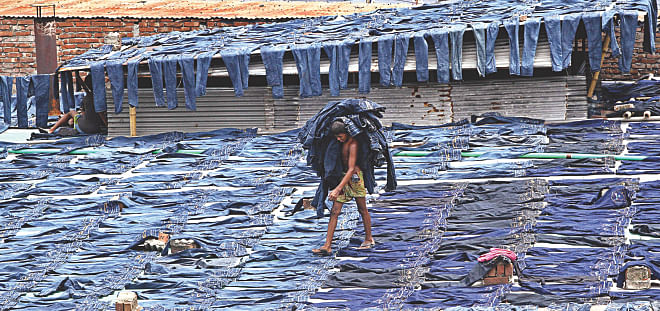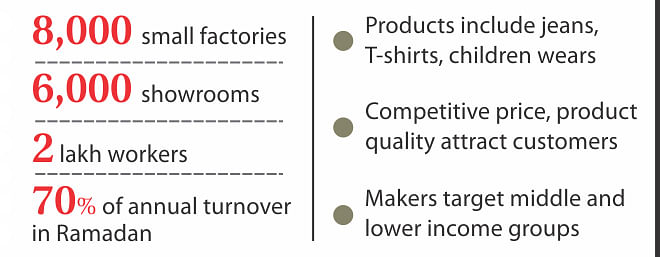Silent revolution in Keraniganj
Silent revolution in Keraniganj
Small factories meet 70pc of local demand for garments; Tk 1,000cr sale expected before Eid

One may get confused to see hundreds of people crossing the Buriganga river by small, wooden boats daily these days instead of using the nearby bridge.
But these people, mostly traders from across the country, prefer to use the Sadarghat boat terminal to make a shortcut entry to the apparel hub in Keraniganj in the southwest part of Dhaka.
The apparel centre that produces denim and woven items, including T-shirts, jeans, shirts, undergarments and children's wear, meets around 70 percent of the demand for such products in the local market.
Apparel makers in Keraniganj, which boasts about 8,000 small factories and 6,000 showrooms, aim to take their sales to up to Tk 1,000 crore during this Ramadan.
In all, about 2 lakh people are employed in these factories and showrooms.

“The bank of Buriganga is emerging as a growing apparel hub in the country due to the product quality and competitive prices,” said Mizanur Rahman, general secretary of a Keraniganj-based garment owners association.
Traders in Keraniganj sell 70 percent of the annual turnover during Ramadan and their sales get momentum from Shab-e-Barat and last till 15th Ramadan, he said.
During the period, around 3,500 traders come to the market from all over the country every day compared to just 250 to 300 on a normal day, he added.
The wholesale hub is mainly popular for its denim products as it accounts for 50 percent of the total readymade garment production in the area.
“An increased number of customers [retailers] are buying denim and woven items from Keraniganj as we offer a wide range of items at lower prices,” said Rahman.
Mustafizul Rahman, proprietor of New Channel Fashion at Ganginarpar in Mymensingh town, who came to the market on Monday, echoed the same.
“I usually come to Keraniganj twice a month,” the retailer said, adding that he could buy a pair of jeans in this market at Tk 50 to 100 less than that in other wholesale markets in Dhaka.
Customers are now more attracted to local products than before because of the quality maintained by the garment makers in Keraniganj, said Ismail Mondol, co-owner of Mondol Garments in Bera upazila of Pabna.
This year, his shop has registered higher sales than last year.
The apparel makers in Keraniganj produce the items targeting both the lower and the middle-income groups.
"In and around the capital, prominent shopping centres are selling clothes made in Keraniganj," said SK Jan-e Alam, proprietor of New Jetu Garments in South Keraniganj.
He sells a pair of normal jeans between Tk 250 and 300 and quality ones at Tk 550 to 2,000.
"The same products cost double or even triple in various outlets in the capital,” he added.
Alam, however, is not happy with the sales so far this Ramadan. Every year, his factory makes 1.25 lakh pairs of jeans targeting the Eid-ul-Fitr but he made around 80,000 pairs this year due to poor sales.
Cost of production has also gone up significantly due to high rent. For his small showroom, he pays Tk 36,000 in monthly rent.
“I am worried about my business, particularly because of such high rent," said Alam, who has been in the business for 25 years.
Frequent load-shedding, poor condition of roads and unplanned expansion of factories and showrooms are among the other major challenges they face. Some roads are so narrow that fire service vehicles cannot reach small factories in case of a fire incident.
Apparel markers in the area design clothes collecting samples from India and China.
Their fabrics come mainly from China, India, Thailand, the UAE and also the local markets such as Islampur.
Wholesalers in the area sell a shirt for Tk 150 to 800, a punjabi Tk 400 to 900, three-pieces Tk 400 to 3,000 and children's wear Tk 150 to 400.
The business model in Keraniganj is a little different from other wholesale markets. Keraniganj traders usually sell a significant bulk of their products on credit to attract retailers from across the country to do business with them.
The trading hub, a cluster of about 200 markets, spread over an area of two kilometres in Aganagar and Suvaddaya unions under Keraniganj Upazila.
Such vibrant trading has already attracted banks to open more branches and transport agencies to set up more offices there.
The area has now branches of about 25 banks and offices of 30 transport agencies.
“Banks are interested to set up more branches in Keraniganj due to the huge business potentials,” said Syed Abdul Momen, head of small business at Brac Bank.
“We have a branch and an SME unit in Keraniganj and these are among the highly rated units for us. We transact Tk 8 to 10 crore daily through the branch,” he told The Daily Star.
Currently, Brac Bank has outstanding loans of Tk 57 crore in Keraniganj against the deposit of around Tk 37 crore, he added.